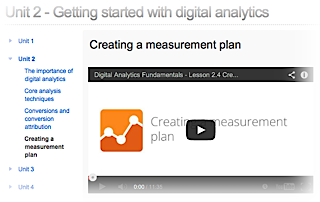 |
| Unit 2/4 - Creating a Measurement Plan |
The Google Analytics Academy started a new course yesterday (March 11th 2014) called "Google Analytics Platform Principles". Though not required, it is recommended completing the "Digital Analytics Fundamentals" course on Analytics Academy before beginning this course:
The fourth part of the second lesson is about measurement plans.
To use analytics efficiently, the data you measure needs to be relevant to your business and goals.
- First decide what to measure, what identifies your business objectives ... the measurement plan
- Document your server technologies, mobile applications, responsive designs, possibilities to use tracking ... the technical infrastructure
- Define code snippets and product features necessary to track relevant data ... the implementation plan
- Start over, refine your plans to measure your products more efficiently or to adapt to changes of the environment.
- define your business objectives - your goals,
- identify strategies to reach your objectives (e.g. eCommerce: selling products, lead generation: collecting leads, content publishing: engagement and revisits, support sites: help finding information, branding: awareness and loyalty),
- choose metrics to indicate performance changes (e.g. revenue, visits, clicks, ...),
- segment your data (e.g. by marketing channel, customer type, geography, ---),
- define targets for your performance indicators.
- string parameter queries,
- server redirects,
- Flash and AJAX requests,
- multiple domains and sub domains,
- responsive webdesign.
- the standard Google Analytics tracking snippet,
- the goal tracking and eCommerce module to cover your key performance indicators (KPI),
- filters to normalize your data,
- campaign tracking and AdWords linking to track marketing activities,
- custom dashboards and reports for analysis and reporting.
No comments:
Post a Comment